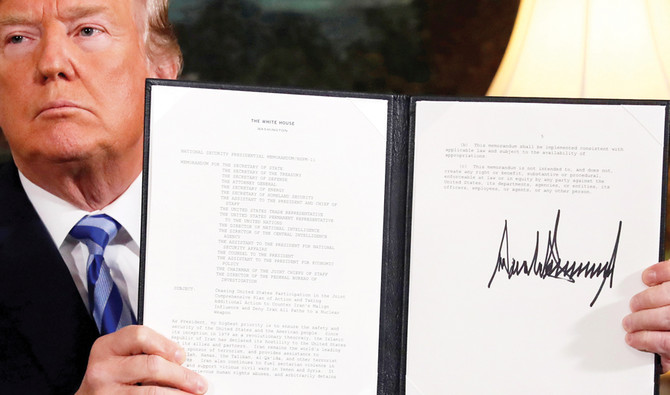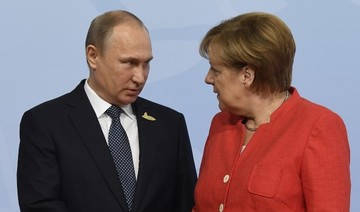BRUSSELS: Iran’s foreign minister said on Tuesday that efforts to save the nuclear deal after the abrupt US withdrawal were “on the right track” as he began talks with European powers in Brussels.
But European diplomats have sought to play down expectations of Tuesday’s meeting, stressing the enormous challenge of finding a way around US sanctions punishing foreign businesses trading with Iran, which have global reach.
“There is no one magic solution — there will be a complicated, comprehensive series of options at both the EU and national level, therefore it will take some time,” a senior EU official said.
Mohammad Javad Zarif met EU foreign policy chief Federica Mogherini ahead of evening talks with his counterparts from Britain, France and Germany — the three European signatories to the 2015 landmark deal who are scrambling to preserve it.
Tehran has warned it is preparing to resume “industrial-scale” uranium enrichment “without any restrictions” unless Europe can provide solid guarantees that it can maintain the economic benefits it gained from the nuclear agreement despite the US reimposing sanctions.
Zarif gave an upbeat assessment after a “good and constructive” meeting with Mogherini.
“I believe we’re on the right track to move forward in order to ensure that interests of all the JCPOA remaining participants, particularly Iran, will be preserved and guaranteed,” he told reporters.
The deal’s official name is the Joint Comprehensive Plan of Action, or JCPOA. The EU insists the deal is working, pointing to repeated UN inspections verifying Tehran’s compliance with its side of the bargain, and Mogherini’s spokeswoman Maja Kocijancic told AFP ahead of Zarif’s arrival that “we must do our utmost to preserve it.”
EU leaders aim to show a united front on preserving the Iran deal when they meet for a pre-summit dinner in Sofia on Wednesday, officials said.
Mogherini and European Commission chief Jean-Claude Juncker will outline to the leaders what measures the bloc could take to shield its now substantial economic interests in Iran.
European firms, especially those from France and Germany, rushed to invest in Iran following the 2015 accord, under which Tehran agreed to freeze its nuclear program in return for the repeal of punishing international sanctions.
German exports to Iran totaled nearly €3 billion in 2017, while French exports soared from €562 million in 2015 to €1.5 billion in 2017 and oil giant Total has pledged to invest some $5 billion in the South Pars gas field.
When he quit the deal last week, US President Donald Trump gave businesses a maximum of six months to wind up operations in Iran or face penalties under American sanctions.
Zarif’s meetings in Brussels cap a whirlwind global tour, including trips to both Russia and China, the two other signatory nations, in a bid to bolster support.
Washington’s decision to go against its European allies’ advice and abandon the deal has pushed them closer to Beijing and Moscow on the issue as diplomats try to keep the pact alive.
French President Emmanuel Macron held phone talks with his Russian counterpart Vladimir Putin on Tuesday, according to a Kremlin statement, which said they had “confirmed Russia and France’s commitment to make the deal work".
Zarif was in Moscow to meet Russian Foreign Minister Sergei Lavrov on Monday, a day after visiting leaders in Beijing.
“The final aim of these negotiations is to seek assurances that the interests of the Iranian nation will be defended,” Zarif said at the start of a meeting.
On Monday Zarif also sent a letter to the UN in which he accused the US of showing a “complete disregard for international law” in pulling out of the deal.
Washington has long complained that the nuclear deal does nothing to stop Iran’s ballistic missile program or its interference in conflicts across the Middle East from Syria to Yemen.
On Sunday, US Secretary of State Mike Pompeo said Washington still wants to work with Europe to counter Iran’s “malign behavior” and was working hard to thrash out a more wide-ranging deal with its European partners.
Ahead of Tuesday’s meeting, British Foreign Secretary Boris Johnson said the European powers would not shy away from pressing Iran on these issues.
“Our meeting with Iranian Foreign Minister Zarif in Brussels is a chance to discuss how we can continue to support sanctions relief with Iran while they maintain their nuclear agreement obligations, but also raise our worries about Iran’s wider, disruptive behavior in the Middle East region,” Johnson said.
But while Pompeo has talked up the prospect of renewed coordination with America’s allies, another top aide reminded Europe its companies could face sanctions if they continue to do business with the Middle Eastern power.



























